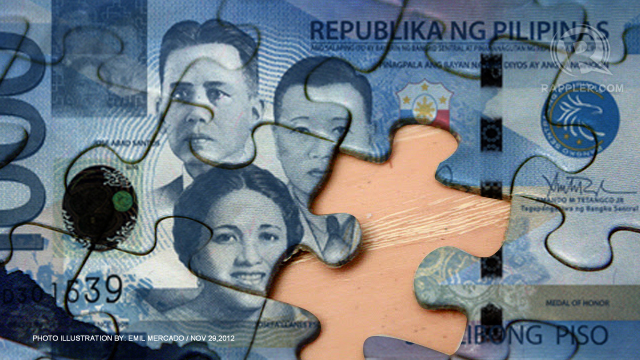SUMMARY
This is AI generated summarization, which may have errors. For context, always refer to the full article.

MANILA, Philippines (UPDATED) – The Philippine budget deficit in the first 10 months of 2012 more than doubled from a year before as government spending picked up.
Data released by the Bureau of Treasury on Thursday, November 29, showed the deficit amounted to P115.736 billion in January to October, up 55.9% from P74.251 billion in the same months last year.
The increase came after government spent P1.369.003 trillion in the economy, 15% higher than the 2011 comparative figure.
Finance Secretary Cesar Purisima said the Aquino administration was able to contain the deficit despite accelerated spending due to higher revenue collections by the country’s main tax bureaus.
Total revenue collections in the first 10 months jumped 12% to P1.253.267 trillion from P1.121.027 trillion last year.
The Bureau of Internal Revenue (BIR), which accounts for 70% of state revenues, generated P858.573 billion, up 13.5% from P756.764 billion last year. The Bureau of Customs, the government’s second-largest revenue source, collected P240.690 billion, 10.6% more than last year’s P217.45 billion.
“This resilient performance from both sides (revenues and expenditures) of the national ledger greatly reduces the risk of fiscal slippage by year-end, as it is well within the full-year deficit program,” noted Purisima.
With only two months left before 2012 ends, the deficit stood at less than half of the full-year target of P279.106 billion.
October deficit
In October alone, the deficit amounted to P9.674 billion, down 54.5% compared to P21.257 billion in October 2011.
During the month, government revenue collections grew faster than expenditures, resulting in a lower budget gap.
“October is the fourth month this year where both major collection units grew double-digits simultaneously, driven by the growth of the cash component of collections,” said Purisima.
“These are dividends of prudent fiscal management and efforts to preserve revenue integrity,” he added.
Revenue collections in October expanded by 29.2% year-on-year to P134.32 billion, while expenditures went up 15% to P143.994 billion.
“The BIR collections surged 22.1% in October with P86.105 billion, while the Bureau of Customs collections soared 17.9% with P26.934 billion. This is the seventh time that BIR registered double-digit monthly growth and the fifth time for BOC,” said Purisima.
The cash component of BIR collections rose 23.1% to P83.512 billion, while that of BOC recorded a 23.2% rise to P26.797 billion.
Growth
Purisima said the lower-than-programmed deficit will allow the Aquino administration to spend for vital programs that will promote inclusive economic growth.
“The current fiscal space continues to be an opportunity for the judicious use of public funds for projects of high and inclusive growth.”
The Philippine economy grew by a surprising 7.1% in the third quarter of 2012, the fastest in Southeast Asia and the second-fastest in Asia, next to China’s 7.7%. The growth beat economists’ expectations of a little over 5%.
The finance chief said the country’s sound macroeconomic fundamentals, including its improved revenue collections, were fruits of the reforms that President Benigno Aquino III has put in place.
“We are confident that we are reaping the dividends of President Aquino’s good governance reforms,” he said.
Aquino, who won on an anti-corruption platform in the 2010 elections, promised to plug the leakage in the tax system by going after tax cheats and smugglers. The BIR, in particular, has been filing tax evasion cases against companies and individuals every now and then.
As of the third quarter, the Philippines’ revenue effort — or revenues as a percentage of gross domestic product (GDP) — stood at 14.7%, against 14.5% last year. The latest deficit figure puts the deficit-to-GDP ratio at 1.4%, well below the 2.6% ceiling for the full year.
Purisima said government efforts to improve revenue collections will not stop.
“The Finance department continues to push for revenue-generating reforms that will allow for sustainable and resilient fiscal consolidation.”
The department is working with allies in Congress for the much-awaited passage of a measure that will reform the country’s excise tax system for so-called “sin” products — tobacco and alcohol.
The measure, which was defeated in past Congresses over the last 15 years, is set to be deliberated on by the bicameral conference committee after both houses of Congress approved their versions of the bill.
The Senate version seeks to raise additional revenues of about P40 billion from higher taxes on tobacco and alcohol, while the House version seeks to raise a lower amount of P31 billion.
“The department will continue to work with our partners in the legislative branch at the bicameral conference committee to ensure we maximize the health and revenue gains at this critical last juncture of this urgent reform measure,” Purisima said. – Rappler.com
Add a comment
How does this make you feel?
There are no comments yet. Add your comment to start the conversation.